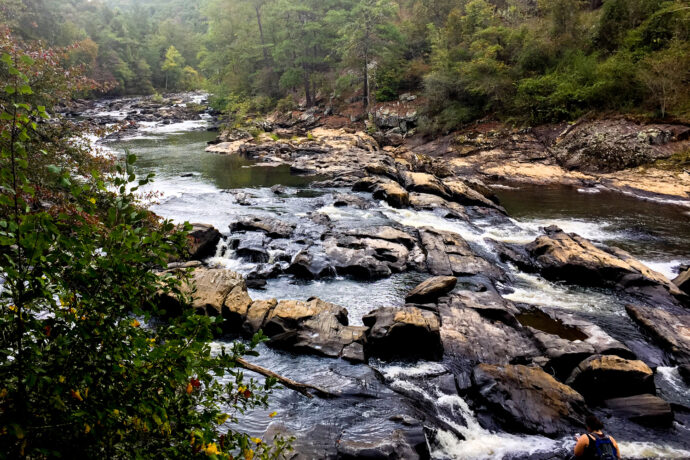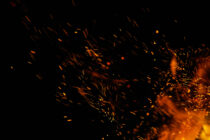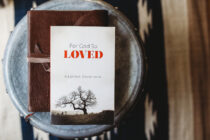“The thing you most need to know about yourself can be found in the place you least want to look.”
—Carl Jung
There’s a place nearby where I love to read. It’s a five-minute drive then a long, meandering walk down vineyard-lined path that eventually ends at a creek. There’s nothing all that special about the creek. It’s unremarkable by most standards, but I love it. It’s a place where the noise of a busy world disappears and the movements of the Spirit are brought back into focus. It’s a small oasis of peace in a world full of stress.
Last fall, having quite a bit of reading to do, I decided to spend my afternoon at the creek. I noticed the change immediately when I arrived. After a summer without rain, I found a bed of dirt, sticks, and debris where once water had bubbled and danced over smooth rocks. It was hauntingly silent.
Like the water flowing in this creek, we are a people conditioned to keep moving, no matter what. The world tells us that our value is in our ability to produce, our status in our ability to consume. “Keep writing, keep tweeting, keep posting, keep purchasing, work harder, stay later. Run longer if you don’t want to become irrelevant.”
Irrelevance: the great threat of the modern age. For those in the West, to be irrelevant is akin to being dead. After all, our greatest cultural value is relevance, but to be relevant we must seek fame, wealth, power—and none of these can be achieved when we’re standing still.
In the church, relevance can mean growing congregations, increasing budgets, and achieving more prominent places of authority in our cities, counties, and denominations. It can mean speaking opportunities, invitations to be on panels, offers to teach important Sunday school classes.
However, there’s a moment in all of our lives—whether it’s due to our own decisions or circumstances outside our control—when we find ourselves dry. The water has stopped flowing, the creek beds of our souls left dry and littered with debris, and we wonder what’s left. In this place, our prayer life may dry up and our love for Scripture grow cold. We no longer feel connected to our community of faith. Our congregation dwindles, and our giving begins to decline. We are no longer invited to speak on panels or nominated for meaningful boards. The creek runs dry.
What happens, we find ourselves wondering, when the momentum stops? What happens when life derails our frenetic work or we find a significant relationship severed? Who are we when we cannot play the upward-mobility game?
Something happened that day at the creek that I found interesting. As I sat there, in a place I’ve sat dozens of times before, I noticed new things: rocks that had long been covered up; fallen trees; trash that had been caught between stones on the creek bed. All of these things were now exposed. I also noticed new sounds: the calls of birds or the rustling of squirrels in the trees—things that had been muted by the constant bubbling of the creek were now amplified. What once felt familiar had taken on new form. What once was hidden had been revealed.
I think this scares us the most—the exposing of all that lies beneath. It’s why we push so hard and work so long and consume too much. We’re afraid of what lies beneath the bubbling brook. When the water stops flowing, we inevitably find things long hidden and willingly forgotten. Memories—run smooth by the passage of time, like water over rocks—shine in the sun. The receding water leaves these stones painfully exposed.
Nobody willingly chooses for the creek to run dry. Nobody prefers pain to joy. Who wants to find themselves vulnerable and exposed? That feels like a pain too great to bear. So we sing songs praying for the rain to fall and the tide to come in and the Spirit to move and the joy of the Lord to overwhelm us, hoping we will not be forced to confront what lurks beneath. But confronting what lurks beneath is the only path toward healing and holiness. Benedictine monk Father Bede Griffiths once wrote: “All the weaknesses we find in ourselves and all the things that upset us, we tend to try and push aside and get rid of. But we cannot do this. We have to accept that ‘this is me’ and allow grace to come and heal it all. That is the great secret of suffering, not to push it back but to open the depths of the unconscious.”
Spiritual life is not a static experience. It has movements. Ravines and hills. Moments of deafening noise and haunting silence. It is colored by grief and joy, contentment and resentment.
What Christians for millennia have understood and taught—and what we so easily forget—is that the spiritual life is not a static experience. It has movements. Ravines and hills. Moments of deafening noise and haunting silence. It is colored by grief and joy, contentment and resentment. There is a texture to the spiritual journey that requires a discerning ear and a patient hand. To understand the depths of God’s love and forgiveness requires that we also understand the depths and nuances of our own soul—both beautiful and broken.
Yes, we need the rain, but we just as desperately need the dryness. As wonderful as a bubbling creek is, having only that will leave us with a stunted spiritual experience, eroded and emotionally and spiritually unaware. Only in periods of dryness are we able to go to certain parts of ourselves; to examine dark corners and deep hurts; to see the riverbed as it is, in all its dusty and meandering glory. Only in these dry times are we able to do the important interior work, and here the Holy Spirit works gently yet powerfully.
Lent is a wonderful time to examine the things left exposed; to take an honest look at the long-covered creek bed and to begin the process of allowing the light to shine on long-hidden nooks in our soul. How have I run from the dryness? What am I trying to cover up? What truth frightens me most?
As frightening as these questions can be, as we trust God with these exposed and vulnerable places, as we embrace the dryness and sit in deep silence of drought, we begin to see God for who God is. As Barbara Brown Taylor powerfully writes: “I have learned things in the dark that I could never have learned in the light, things that have saved my life over and over again, so that there is really only one logical conclusion. I need darkness as much as I need light.”








0 Comments